
Language Resources and Evaluation
Scope & Guideline
Cultivating knowledge in language resources and evaluation.
Introduction
Aims and Scopes
- Linguistic Resource Development:
The journal emphasizes the creation and enhancement of diverse linguistic resources such as corpora, lexicons, and annotations that facilitate natural language processing (NLP) and computational linguistics. - Evaluation Methodologies:
It explores various methodologies for evaluating language technologies, including benchmarks and performance assessments in tasks like sentiment analysis, machine translation, and named entity recognition. - Cross-Linguistic Studies:
The journal encourages research that examines language resources across different languages, focusing on comparative studies, cross-linguistic annotations, and multilingual resource development. - Emerging Technologies in NLP:
It highlights the integration of advanced technologies such as machine learning, deep learning, and artificial intelligence in the creation and evaluation of linguistic resources. - Interdisciplinary Approaches:
The journal supports interdisciplinary research that combines insights from linguistics, cognitive science, and computer science to enhance the understanding and processing of human language.
Trending and Emerging
- Sentiment Analysis and Emotion Detection:
Recent publications increasingly focus on sentiment analysis, particularly in diverse and low-resource languages, reflecting a growing interest in understanding emotional nuances in textual data. - Multimodal and Multilingual Resources:
There is a rising trend towards developing resources that integrate multiple modalities (text, audio, visual) and cater to multilingual contexts, enhancing the applicability of language technologies. - Low-Resource Language Processing:
Research addressing the challenges of processing low-resource languages is gaining prominence, highlighting the need for inclusive technology that accommodates linguistic diversity. - Interoperability and Resource Sharing:
Emerging themes include interoperability between different language resources and platforms, promoting collaboration and resource sharing among researchers and institutions. - Application of Advanced Machine Learning Techniques:
The incorporation of advanced machine learning techniques, particularly deep learning, in the evaluation and enhancement of language resources reflects a significant shift towards data-driven methodologies.
Declining or Waning
- Traditional Linguistic Analysis:
There has been a noticeable decrease in publications focusing solely on traditional linguistic analysis without integration into computational frameworks, as the field increasingly leans towards technology-driven approaches. - General Corpus Linguistics:
Research centered on general corpus linguistics, without specific applications or advancements in NLP technologies, has diminished, possibly due to the growing emphasis on applied language technologies. - Manual Annotation Techniques:
The reliance on manual annotation methods is declining as automated and semi-automated approaches are gaining traction, reflecting the shift towards efficiency and scalability in resource development. - Static Language Resources:
The focus on static language resources that do not incorporate dynamic or evolving elements is waning, as researchers seek more adaptable and context-sensitive resources. - General Surveys without Novel Contributions:
The publication of general surveys that do not provide novel insights or methodologies is decreasing, as the journal prioritizes original research contributions that advance the field.
Similar Journals
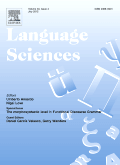
LANGUAGE SCIENCES
Exploring the Depths of Linguistic InnovationLANGUAGE SCIENCES, published by Elsevier Science Ltd, stands as a prominent journal in the field of linguistics and language studies. With an impressive impact factor that solidifies its reputation, it holds a Q1 ranking in both the linguistics and language categories for 2023, reflecting its excellence and relevance in cutting-edge research. Since its inception in 1979, this journal has evolved to encompass a wide range of interdisciplinary studies, providing a platform for innovative research that addresses the complexities of language use, acquisition, cognition, and social interactions. The journal is hosted in the United Kingdom and features rigorous peer-reviewed articles that contribute significantly to both the academic community and practical applications in language-related fields. With access options tailored for a diverse range of readers and contributors, LANGUAGE SCIENCES invites scholars, students, and professionals to engage with its comprehensive body of work and contribute to the ongoing discourse in linguistics.
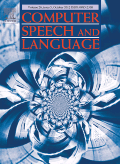
COMPUTER SPEECH AND LANGUAGE
Fostering Collaboration in Speech and Language StudiesCOMPUTER SPEECH AND LANGUAGE, published by Academic Press Ltd - Elsevier Science Ltd, stands as a pivotal journal in the fields of Human-Computer Interaction, Software, and Theoretical Computer Science. With an esteemed Q2 ranking in Human-Computer Interaction and top-tier Q1 rankings in both Software and Theoretical Computer Science for 2023, this journal plays a critical role in disseminating innovative research and advancements in computational linguistics and interactive systems. Since its inception in 1986, it has become a sought-after platform for researchers, professionals, and students seeking to deepen their understanding of computer-aided speech processes and language technologies. The journal's comprehensive scope encompasses a wide range of interdisciplinary studies, fostering a collaborative research environment that explores the intersection of technology and human communication.
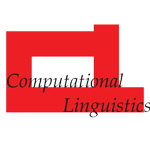
COMPUTATIONAL LINGUISTICS
Bridging Linguistics and Artificial IntelligenceCOMPUTATIONAL LINGUISTICS is a premier academic journal published by MIT Press, focusing on the intersection of linguistics and artificial intelligence. With the ISSN 0891-2017 and the E-ISSN 1530-9312, the journal serves as a key resource for researchers and practitioners in computational linguistics, a field that plays a crucial role in advancing language processing technologies. Since adopting an Open Access model in 2017, the journal has broadened its accessibility, encouraging a global exchange of ideas and research findings. It consistently ranks within the top quartiles of its respective fields, achieving Q1 status in Artificial Intelligence, Computer Science Applications, and Linguistics and Language as of 2023. This notable standing is further reflected in its Scopus rankings, placing it in the 99th percentile for Language and Linguistics, and maintaining a prestigious position in various computer science categories. The journal publishes cutting-edge research, theoretical frameworks, and practical applications, and aims to foster interdisciplinary collaboration among linguists, computer scientists, and AI specialists. As the field evolves, COMPUTATIONAL LINGUISTICS remains an essential platform for disseminating transformative ideas and pioneering work that shapes the future of language and technology.
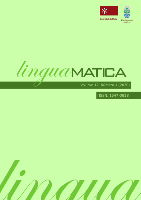
Linguamatica
Shaping the Future of Language Studies Together.Linguamatica is a prominent open-access journal published by UNIV MINHO, INST EDUCACAO, CENTRO INVESTIGACAO EDUCACAO in Portugal, with the objective of advancing the field of linguistics and language studies. Since its establishment in 2009, the journal has served as a vital platform for disseminating high-quality research and innovative studies in linguistics, emphasizing both theoretical and applied perspectives. With an impressive Scopus ranking placing it in the 76th percentile in Arts and Humanities and the 73rd percentile in Social Sciences, Linguamatica is recognized for its significant contributions and rigorous peer-review process. The journal's commitment to open-access publishing ensures that research findings are accessible to a wider audience, fostering collaboration and knowledge sharing among researchers, professionals, and students. Located at CAMPUS GUALTAR, BRAGA 4710, PORTUGAL, Linguamatica aims to be a leading source of valuable insights in linguistics, covering a diverse array of topics from language acquisition to sociolinguistics, thereby playing a crucial role in shaping contemporary language research.
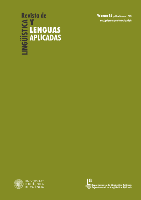
Revista de Linguistica y Lenguas Aplicadas
Connecting Scholars in the World of LinguisticsRevista de Linguistica y Lenguas Aplicadas, an esteemed journal published by UNIV POLITECNICA VALENCIA, EDITORIAL UPV, is a pivotal resource in the field of linguistics and applied languages. Since its inception, the journal has embraced Open Access publishing since 2006, ensuring that its rich repository of research is readily available to a global audience of researchers, academics, and language professionals. Headquartered in Valencia, Spain, the journal contributes significantly to the advancement of linguistics knowledge, boasting a respectable ranking within the Q3 quartile for Linguistics and Language (2023) according to Scopus metrics. It covers a diverse range of topics and methodologies, engaging readers through its commitment to scholarly rigor and innovation. The journal is uniquely positioned to inform and inspire essential discussions from 2015 to 2024, making it a vital platform for emerging linguists and seasoned scholars alike, as they explore the evolving landscapes of language and communication.
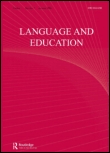
Language and Education
Unveiling the Power of Language in Educational ContextsLanguage and Education is a leading academic journal published by Routledge Journals, Taylor & Francis Ltd, specializing in the intersection of language studies and educational practices. With an impressive Q1 ranking in both Education and Linguistics and Language categories for 2023, it stands out as a crucial resource for researchers, educators, and industry professionals. Covering a wide array of topics pertinent to language acquisition, pedagogical methodologies, and culturally responsive education, this journal supports rigorous scholarship in the field. While not currently offering open access options, its contributions are vital for advancing knowledge and fostering innovation across disciplines. The journal's long-term commitment to excellence is evidenced by its high rankings in Scopus, placing it in the 94th percentile in Language and Linguistics and the 80th percentile in Education. Since its inception in 1987, Language and Education has not only tracked the evolving landscape of language education but has also actively shaped it, making it an indispensable tool for anyone invested in educational research and practice.

Lingue e Linguaggio
Cultivating a Rich Discourse in Language and LinguisticsLingue e Linguaggio, published by SOC ED IL MULINO, is a distinguished academic journal in the field of Linguistics and Language, hailing from Bologna, Italy. With an esteemed Q2 ranking in its category as of 2023, this journal is recognized for its contributions to both the arts and humanities as well as social sciences, achieving notable positions within Scopus rankings. It serves as a vital platform for researchers, practitioners, and students interested in exploring various linguistic phenomena, language dynamics, and theoretical frameworks. Although it operates under a traditional subscription model rather than open access, its comprehensive array of studies and publications provides significant insights and fosters academic discourse. With a publication period extending from 2002 to 2024, Lingue e Linguaggio continues to be a key resource for advancing the understanding of language in contemporary contexts.
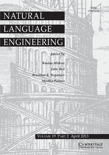
Natural Language Engineering
Elevating Academic Discourse in Natural Language ProcessingNatural Language Engineering is a premier journal published by Cambridge University Press, dedicated to advancing the field of artificial intelligence and its intersection with linguistics and software. Since its inaugural publication in 1995, the journal has established itself as a vital platform for innovative research and development in natural language processing (NLP) and engineering. With a notable impact factor reflecting its influential contributions, it ranks in the top tiers across various categories, including Q1 in Linguistics and Language and Q3 in Artificial Intelligence. Researchers and practitioners alike benefit from the opportunity to access insightful articles that address both theoretical aspects and practical applications of NLP technologies. Although it operates under a traditional subscription model, the rigorous peer-review process ensures high-quality publications that foster academic discourse and collaboration within the community. This journal is essential for anyone interested in the evolving landscape of language engineering, making it a cornerstone reference for upcoming scholars and seasoned professionals aiming to push the boundaries of knowledge in this dynamic field.

Transactions of the Association for Computational Linguistics
Exploring the Intersection of Language and AITransactions of the Association for Computational Linguistics, published by MIT Press, serves as a premier open access journal dedicated to advancing the field of computational linguistics. Established as a key resource since 2013, this journal enhances the dissemination of research, offering unlimited access to groundbreaking studies. It holds an impressive array of category quartiles in 2023, ranking in the Q1 quartile across multiple disciplines including Artificial Intelligence, Communication, Computer Science Applications, Human-Computer Interaction, and Linguistics and Language. Further emphasizing its remarkable impact, the journal ranks #1 in both Linguistics and Communication, placing it at the forefront of social sciences. These factors contribute to an overall Scopus percentile ranking that epitomizes the journal's relevance and superiority within its domain. As researchers, professionals, and students seek to explore and contribute to the rapidly evolving landscape of language technology, this journal stands as an indispensable platform for sharing innovative ideas and studies within the community.

Porta Linguarum
Advancing linguistic insight for a transformative educational landscape.Porta Linguarum, published by UNIV GRANADA in Spain, is a pioneering journal dedicated to the fields of linguistics and language studies, with a dual focus on the educational implications and applications within these disciplines. Launched in 2008 and continuing its impactful contributions into 2024, the journal is recognized for its rigorous peer-reviewed articles that address contemporary language issues, pedagogical approaches, and linguistic research, evidenced by its notable rankings in the 2023 Scopus metrics. Porta Linguarum holds a distinguished Q1 classification in Linguistics and Language, alongside a respectable Q3 placement in Education, marking it as a valuable resource for academics and practitioners alike. With an impressive ranking of 231 out of 1088 in the Arts and Humanities category and a strong 78th percentile ranking for Language and Linguistics, this journal facilitates the exchange of innovative ideas and promotes scholarly discourse. Although currently not adopting an open access model, it remains an essential platform for advancing knowledge in linguistics and education.